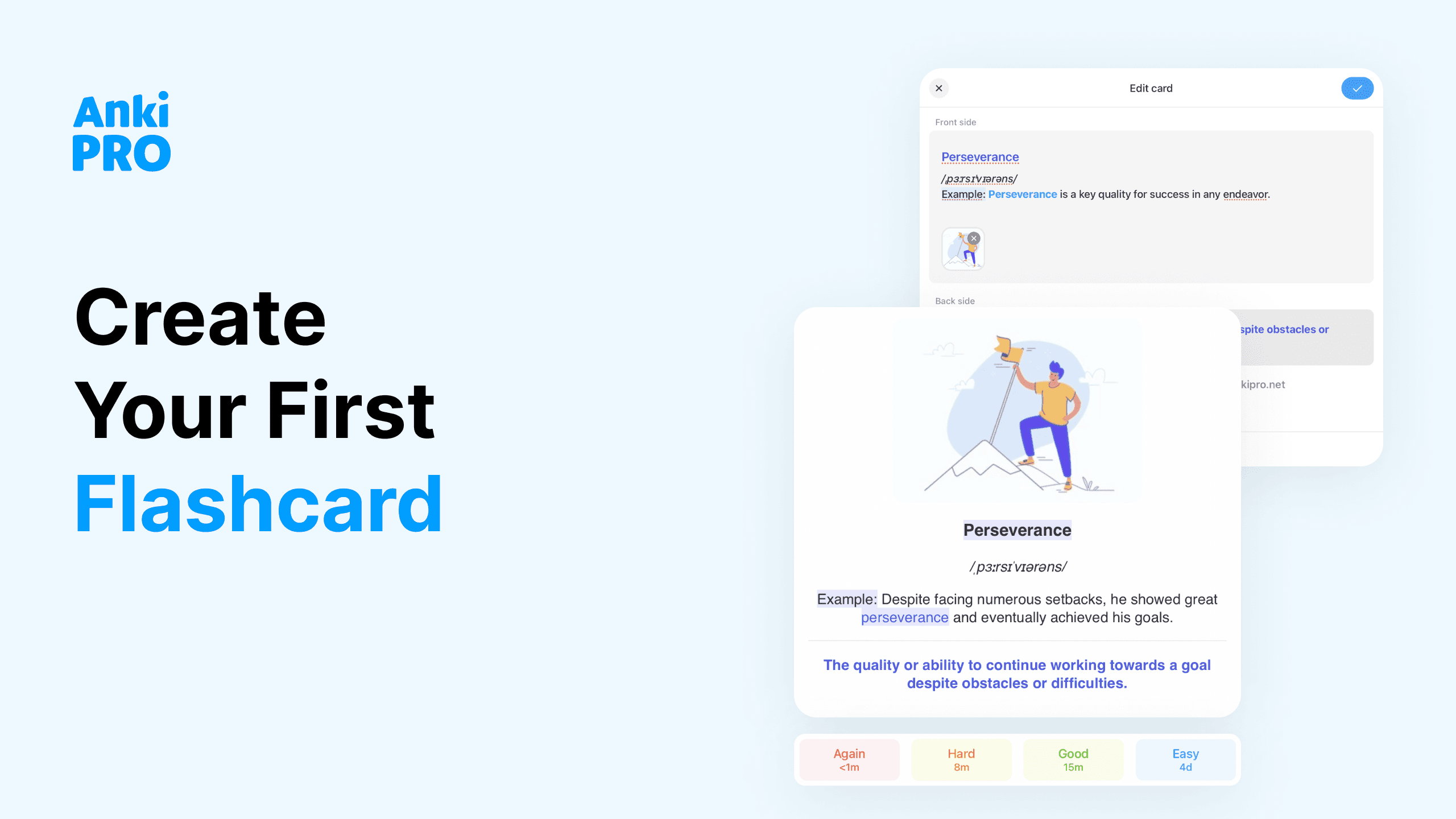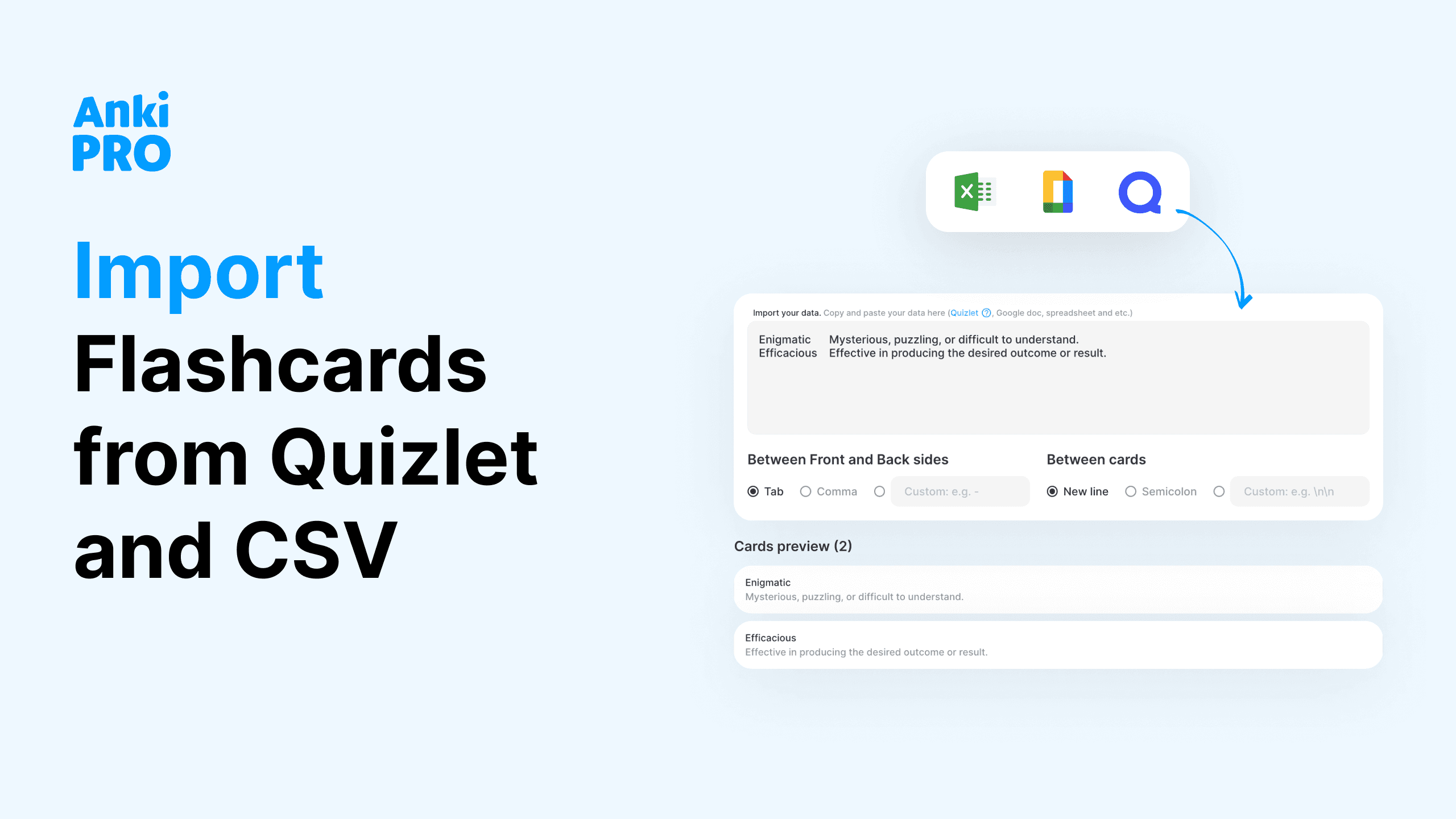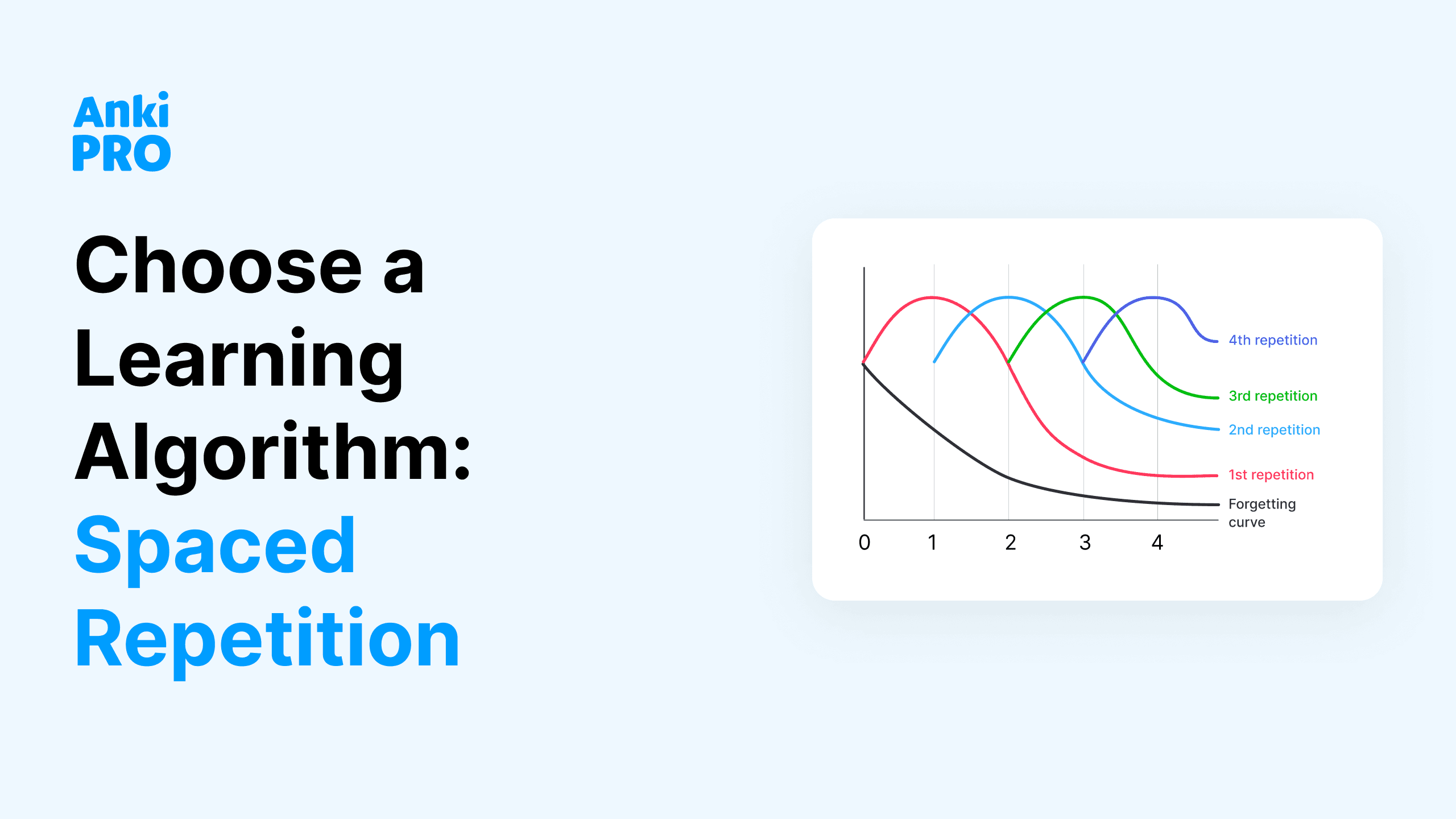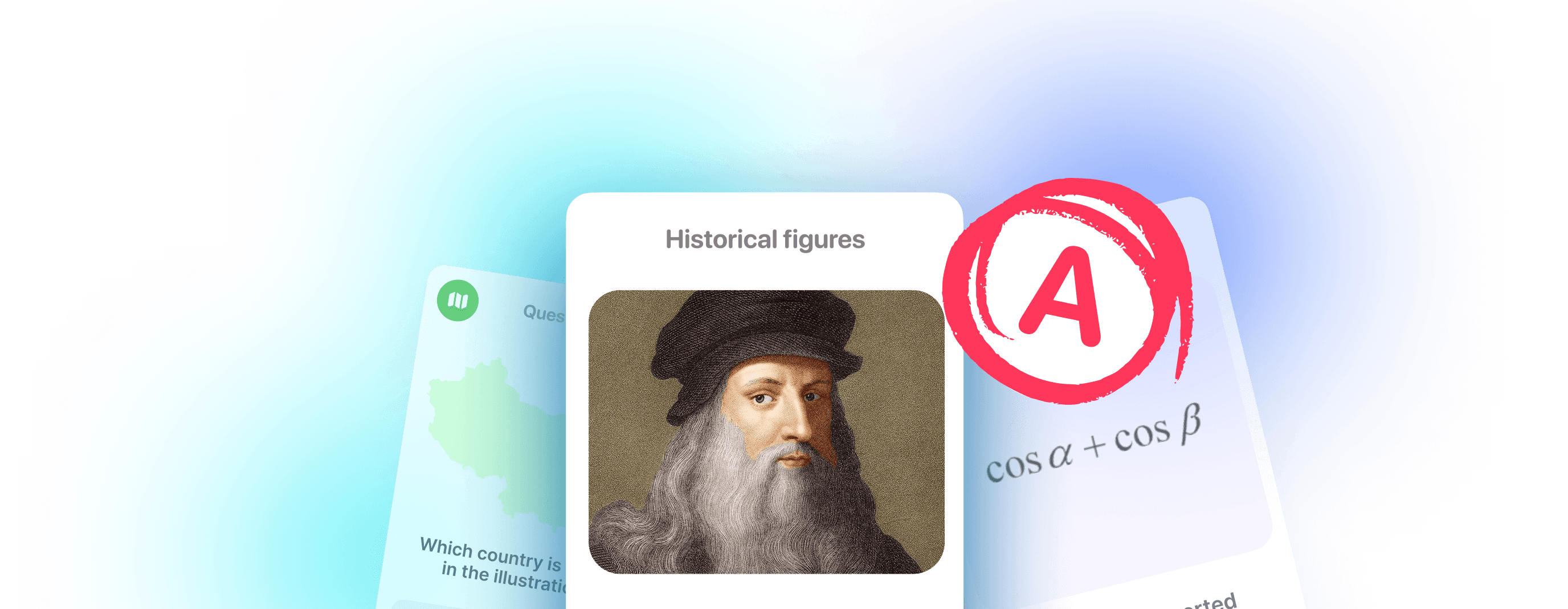The ADHD brain has different ways of getting things done. People with ADHD often find productive ways to work with their brain chemistry, but this can be challenging when there’s an exam coming up or a particularly imposing assignment.
It can be intimidating to sit down and study with ADHD, but let’s change the rules of the game so you can set yourself up for success in a way that works for you. Read on for five strategies to work with your ADHD to get some seriously powerful studying done.
Strategy #1: Find your study buddy
ADHD (attention deficit hyperactivity disorder) presents in many ways. Some people struggle with time management and focus, while others can get focused with ease, but only for a few minutes at a time. Some people thrive with background noise, while others have zero tolerance for distractions.
Whatever your ADHD symptoms, having a buddy can help you stay in the moment and focus on the task at hand.
Students with ADHD, unite!
Your partner in studying can be another college student or even a friend or family member. They can be sitting next to you or hanging out on Zoom. The benefit of a such a partnership remains the same: accountability, time management and support.
Align with your partner
Depending on your ADHD symptoms, you might want your buddy to be completely silent, or you might prefer if they talk things out with you. You might want to work in a coffee shop where the noise and people in the room can keep you focused, or work in a quiet library with a classmate one-on-one.
Having a partner for learning can keep you anchored to the present so you can achieve better focus and improve your academic performance. Try out different types of study buddies to see which help you.
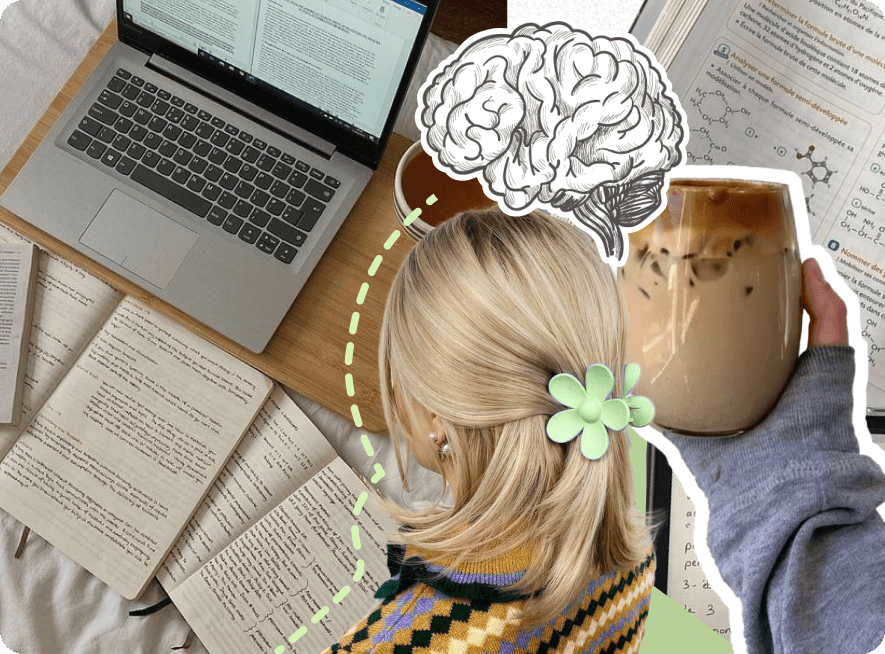
Strategy #2: Get into a hyper-focused state
While students with ADHD might have a hard time focusing on tasks that don’t interest them, they also have access to a phenomenon called “hyperfocus.” Research suggests that hyperfocus is a form of “locking in” to a subject. When students with ADHD are in a hyper-focused state, they are in a powerful flow and may have trouble shifting their attention elsewhere.
Trigger hyperfocus
“Everyone has a few ways of triggering their own hyperfocus, and sometimes it kicks in without you even knowing,” said Catherine B., a recent student. “I’m either operating at 0-20% focus or at 100% focus, and there is no in between. But once I trigger hyperfocus, I can easily forget what time it is and get lost in what I’m doing.”
For Catherine, part of easing into hyperfocus is making sure she is well-rested and has things to eat and drink around her. Part of it also involves tricking her brain by starting with something enjoyable.
“I start hard work by multitasking with something fun, like watching TV. My theory is that the fun activity triggers a dopamine release and, because I’m multitasking, I can trick my brain into believing the dopamine comes from the hard work. Eventually, I manage to focus properly on the hard work and pause the TV at the point where it starts to become white noise.”
Take care of yourself during hyperfocus
Sometimes with hyperfocus, the issue isn’t always sitting down and getting started, but stopping once you’re in a focused state.
“I set alarms for everything before I start studying,” said Catherine. “And then I make sure to stop after a certain amount of hours. It’s very easy to slip into ‘maybe I’ll do a little more’ and then the next day, you’re entirely spent and can’t trigger hyperfocus again.”

Strategy #3: Set constraints to help you focus
Take a deep breath. Get up and stretch. Have a glass of water.
Can you spend study only five minutes of time studying, and then watch a Youtube video?
It’s okay to study differently. Different strategies are helpful for different students with ADHD. For example, you can try to set achievable time limits and constraints to help you get started when it’s study time. If you have a chapter to study, try going one section at a time, or even one paragraph at a time.
Reading is passive, so perhaps you can turn it into a game or add more rules for comprehension. For each paragraph you read, try writing a one-sentence summary, or even recording short voice memos if the audio version of notes is more exciting to you. Can you summarize one more paragraph before you take a break? Could reading out loud while you pace help you focus?
The Pomodoro Method
Some swear by the Pomodoro Method, which builds in study breaks to help ADHD children and students manage your attention span.
It’s simple: set a timer for twenty-five minutes and study until the timer goes off, and then take five-minute short breaks. Every four intervals, take a longer break of fifteen to thirty minutes.
Maybe you need to start with shorter intervals of studying, or take longer breaks. Feel free to customize the intervals to work for you. Having realistic goals is key to finding effective methods to cope with ADHD. You have to aim at studying smarter, not harder.
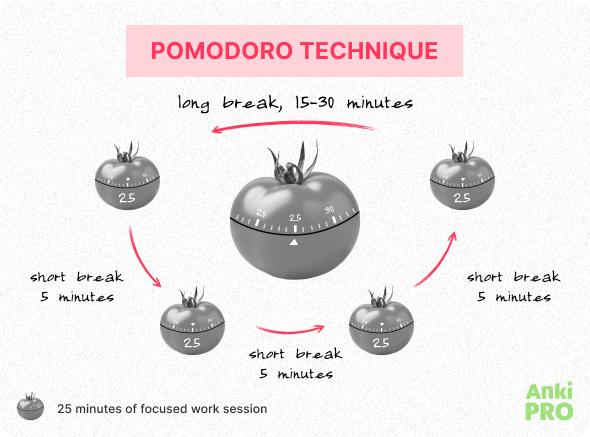
Find the constraints that work for you
It takes time to identify the ADHD studying method that helps you stay focused around one task at a time.
“My best tip is to create small false deadlines and due dates, that way the stress of a looming deadline will push you through any inertia,” said Reddit user allieg806. User Feeling-Visit1472 shared that they enjoy a “solid low-fi study playlist… With ADHD, so much of your success can come down to these weird, intangible factors like ambiance and how your brain is feeling, so set yourself up for winning.”
Strategy #4: Get plenty of rest
Studies show that everyone — with or without ADHD — benefits from a solid night’s sleep. Sleep does more than give you the energy to wake up and perform the next day. Research shows that sleeping has a vital role in consolidating what you study into long-term memory.
Research on sleep and test performance
In 2019, MIT researchers tried to find a correlation between exercise and test scores. Surprisingly, there were no differences in outcomes between groups that exercised and those that didn’t. But there was a strong correlation between sleep quality and performance: 25% of the variation in test scores had to do with how well students slept the night before.
As you face an upcoming test or assignment, make sure to value sleep just as much as you do your study sessions.
Caveat: while physical exercise doesn’t necessarily impact test scores, it does impact your ability to focus. Doing 20-30 minutes of aerobic exercise a day, like going for a brisk walk or heading to the gym, can help improve your executive functioning skills.
Study right before bed
Research shows that you remember more if you review your materials ten to fifteen minutes before you go to sleep. Doing this allows your brain to process what you studied while you’re asleep, which helps turn short-term memories into long-term memories. Make sure your a late night study session doesn’t cause sleep problems.
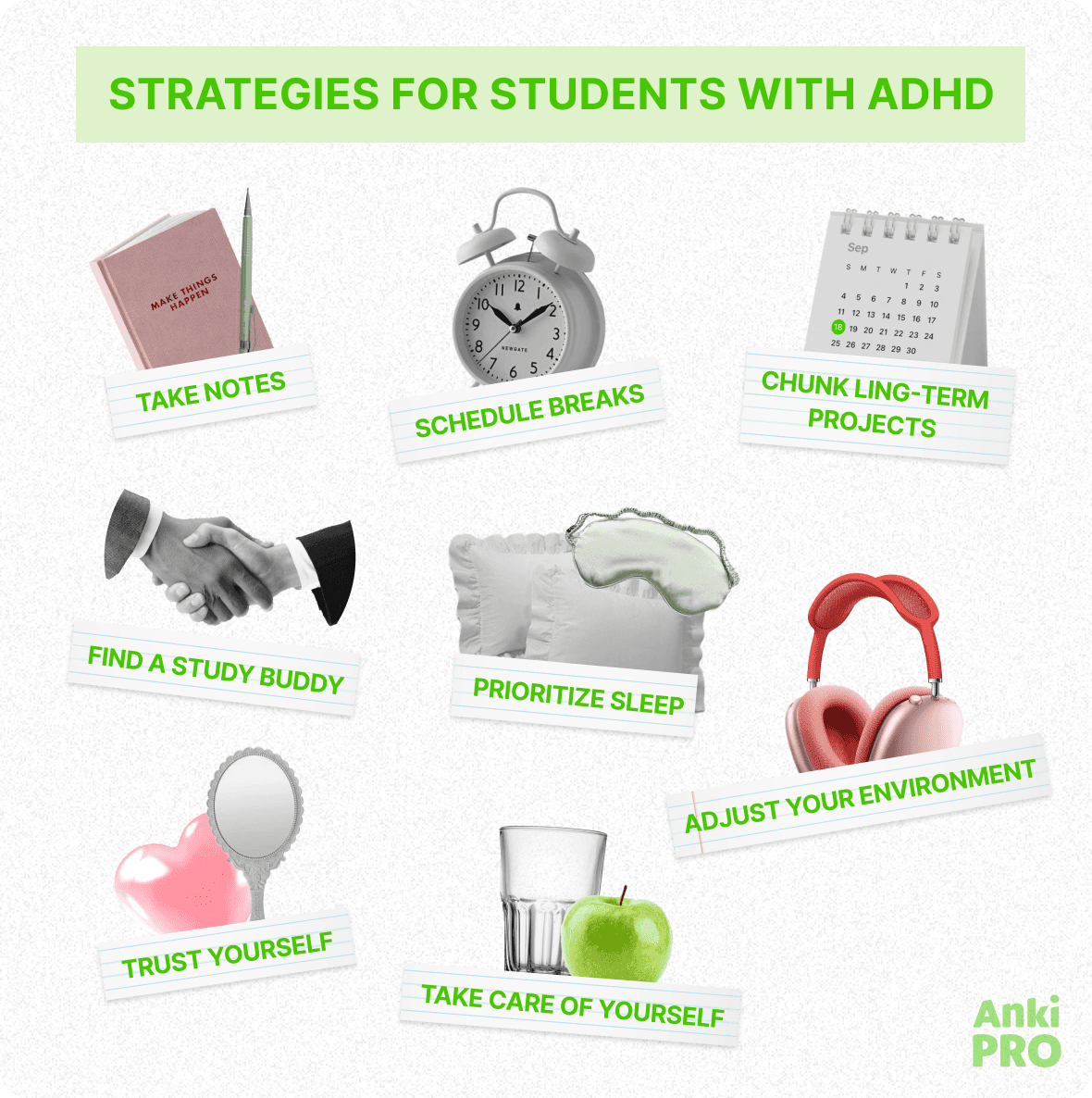
Strategy #5: Understand and accept your brain
You may read this strategy and roll your eyes. That’s understandable. Accepting the way your brain processes information isn’t easy, especially when educational systems demand that all students learn in a certain way.
College students and school children with ADHD don’t get enough support and understanding why they do everything the last minute before the big test, or why taking notes and learning terms might be so hard to them. Now, sunce the attention deficit disorder is becoming so “popular”, different study strategies for students with ADHD are required as never before. You have the right to study differently!
The fact that your brain operates differently doesn’t make it better or worse. It’s just different. And different people thrive in different environments. Which environment is best for you to feel motivated?
Identify accommodations
If you’d feel better with more time on tests, great. If you’d prefer to take your tests in a separate room with fewer distractions, wonderful. Whatever you need, it’s likely that your academic organization can provide it. All you have to do is ask.
Avoid a sense of shame
And if you don’t feel comfortable asking, that’s normal, too. It’s important to understand where your hesitancies are coming from. Internalized shame is hard to avoid when the world tells you that you have a disability or a disorder — it’s in the name itself! — but don’t let that shame get in the way of your success.
Acknowledge your gifts
Those with ADHD can be more intuitive, creative, and skillful in unstructured situations and conversations. There are gifts that come with thinking differently — what are yours?
“The unfocused part of my brain can actually be really useful during studying,” said Catherine. “Thanks to the constant stream of thoughts, my ADHD brain makes connections that are often as random as they are brilliant.”
Trust yourself
Only you know how to get the best out of yourself. For some students with ADHD, medication is key to help them feel their best. Other college students just need a slightly different environment in order to focus and effectively study with ADHD. Finding the right study technique, an ADHD coach, or engaging study materials are just a few tips to include in your to do list.
Everyone’s ADHD is different, and the solution will look different for everyone.
There is always a way forward. Trust yourself to know what you need to support your academic performance. Attention disorders should not stand in your way of achieving your goals!
Master ADHD studying
Have a go at these five study tips and reach out if you have others you’d like to share. There are so many ways to approach studying with ADHD for college students and adults with ADHD, and with enough time and effort you’ll be able to find a replicable rhythm that works for your type of attention deficit hyperactivity disorder. Should you get noise canceling headphones to eliminate distracting sounds? Or should you download two hours of ambient music for your study sessions? Find your strategies, find your power to master learning with ADHD.
If it doesn’t get better, consider seeking professional help. Modern day adolescent psychiatry offers effective solutions that are helpful to students who suffer from attention deficit.
But for now, get some sleep. You’ve got this!






